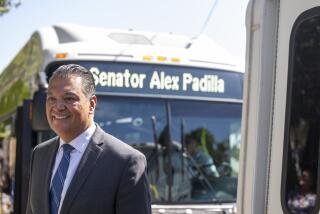Mayors Oppose EPA’s New Smog Limits
As the White House prepares to weigh in on whether the federal government should strengthen clean air standards, the U.S. Conference of Mayors voted resoundingly Tuesday to oppose a plan to set strict new limits on smog and soot.
At the heart of the mayors’ vote was a deep skepticism over the science behind the Environmental Protection Agency’s tougher standards on ozone and particles, a loathing at the local level to pay the costs of a federal mandate, and a fear that the proposed standards could jeopardize other government programs.
“How would we attract new business to come to our cities and keep the businesses that are here without defensible standards? . . . Who’s going to pay for it?” asked Detroit Mayor Dennis W. Archer, pointing to the standards’ $60-billion price tag. “How can I get our unemployed jobs if I can’t attract business?”
The vote is merely an expression of dissatisfaction with the federal measure and does not exempt local governments from complying with the regulations.
Under the EPA proposal--unveiled in November and due to be finalized July 19--the air in more than 400 counties would be deemed unsafe. Those counties must then take steps over the next 15 years to clean it up.
In most areas, that would force regulations curbing exhaust from vehicles, power plants, industrial plants and consumer products.
The president is expected to decide by the end of next week whether to endorse or weaken the EPA proposal. There is no consensus in the administration about what to do, and EPA Administrator Carol Browner has said that she will not back down on her proposal.
Across the country, local and state officials have been divided on how the Clinton administration should proceed when it comes to the decade’s most far-reaching environmental policy. Many have endorsed the EPA’s stronger standards in some of the nation’s largest and most polluted cities and regions, including Southern California, New York and Massachusetts.
Some of that division has shown up throughout the group’s proceedings here--both on Tuesday morning during a heartfelt debate and vote, and on Saturday, when the resolution was drafted.
The resolution declares that the proposed standards have the potential to “jeopardize progress toward other federal priorities that are equally important to achieving sustainable communities, such as the revitalization of our cities, empowerment zone initiatives, job creation.”
Rosemary Corbin, mayor of Richmond, Calif., cast the lone “no” vote against the resolution. To Corbin, whose Bay Area city is home to oil refineries and other industry, the stricter standards are a health issue, and the scientific studies underpinning them are sufficient.
“With sustainable development, it is important to have a healthy environment in order to have a healthy economy,” Corbin said.
Amid much public hand-wringing about America’s eroding faith in government, the majority of the 300 mayors in attendance said they did not trust the federal government and its scientific studies.
Tulsa Mayor M. Susan Savage voiced concern about stiffening the standards for particulate pollution--the byproduct of fuel combustion--because she does not believe that government monitoring of particulates is sufficient.
Archer said that the EPA has not offered “ample scientific data that gives anybody a comfort level. What is the evidence to show the new regulations will improve the public health?”
Seattle Mayor Norman B. Rice looked askance at the federal government for another reason: the unfunded mandate, or what the mayors view as Washington’s bad habit of giving lots of orders but no financial help.
“I’m willing to have very strong standards, if the federal government is going to help us pay for it,” Rice said. “I’m for shared costs.”
To which a derisive Richard M. Daley of Chicago replied: “Shared costs? You’re kidding yourselves. When the EPA comes along, you pay for it. The taxpayers pay for it.”
EPA officials say their proposed standards would rescue 15,000 people each year from premature death due to cardiac and lung diseases traced to particulates. They would also prevent several hundred thousand asthma attacks, bronchitis cases and other respiratory illnesses, especially among children.
In addition to fomenting the strongest debate, the mayors’ votes on the clean air proposal also drew the most protest. On Monday, demonstrators with the California Public Interest Research Group donned gas masks and marched--with a 10-foot foam tombstone--to the Fairmont Hotel where Clinton was addressing the conference.
“The basic message is that air pollution kills,” said Jon Golinger, CalPIRG’s legislative advocate. “These standards will save lives. Voting against the standards is pure politics. When politics affects peoples’ health and the air we breath, that’s a problem.”
More to Read
Get the L.A. Times Politics newsletter
Deeply reported insights into legislation, politics and policy from Sacramento, Washington and beyond. In your inbox three times per week.
You may occasionally receive promotional content from the Los Angeles Times.







